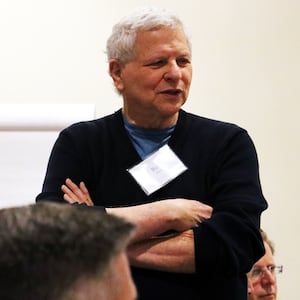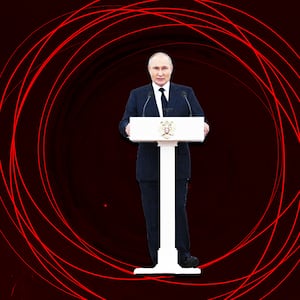Victory Day, commemorating the triumph of the USSR over the Nazis, was once again a source of great fanfare and attention in the countries of the former Soviet Bloc. The day brought, as it has in the past, military parades and solemn commemorations. And, as has often been the case in the past, it brought a rousing presidential speech that conveyed great strength and resolve in the contemporary battle against Hitler’s successors.
The twist this May 9 was that the inspiring oratory came not from Russia’s President Vladimir Putin, who offered a lackluster, slogan-laden retread of a speech, but from the man who has for more than two months led the effort to deny Russia an expected victory in Ukraine, Volodymyr Zelensky.
Indeed, the speech from Ukraine’s president revealed the hollowness of both Putin’s words and the pomp of the Red Square military parade with which Russia has traditionally made a big show of flexing its muscles for the world.
Both presidents evoked the Nazis in describing their adversaries in the current war. But when Putin said that his nation was “fighting so that no one forgets the lessons of World War II, so that there is no place in the world for executioners, punishers, and Nazis”—his words were bitter reminders that he has made the Russia that once showed such courage in defeating Hitler’s armies into the heirs of the Nazi legacy of wanton brutality.
Zelensky made that very point in a speech which showed the oratory gifts the world has come to expect from the comedian and media entrepreneur turned president. Calling Putin a madman, he condemned his Russian counterpart and adversary as “the one who is repeating the horrific crimes of Hitler’s regime today.”
In a carefully crafted video message, Zelensky’s point was inescapable: Russia’s effort is doomed precisely because Putin has not only forgotten the lessons of World War II but because he’s defiled and abused the memory of its victims and heroes.
Zelensky’s video was stark and involved none of the flash and posing of the Russian “celebration.” But in that simplicity and starkness, it revealed the sham and betrayal of Russia’s parades.
Russia could muster rows of troops in freshly pressed uniforms and displays of military hardware. But it was clear that there were fewer troops and weapons available today than there were just over two months ago. The array of military hardware on display was far more limited, and Putin made a rare public acknowledgment of the Russian soldiers who have fallen since he escalated his eight-year assault against Ukraine in February.
Putin repeated his oft-debunked accusations that the Ukrainians and the West are responsible for the current war. But the speech was perhaps more notable for what was not said.
Some Western analysts expected Putin to use the occasion to announce a major escalation of the conflict. But not only did that not come, but his reversions to stale nationalist rhetoric also suggested that this may be a leader who is running out of options.
Questions were also raised by the fact that a planned fly-over of Russian military aircraft did not take place due to “weather conditions”… on a perfectly lovely May day in Moscow. The government of Ukraine was, however ready to fill the void by the release of its own video, mocking the Russian parade that featured a wide array of Russian military helicopters and military vehicles doing what the Russians have done so frequently in Ukraine, hauling stolen Ukrainian washing machines and other household appliances back home.
The reality is that it is hard to host a good old-fashioned victory day celebration when you’re losing.
Who knows what kind of celebrations Putin may once have envisioned for this week when he initially launched his invasion. Perhaps he had hoped the parade would feature spoils of victory, claimed weapons, perhaps a corresponding celebration before his generals in a Kyiv that was returned to its “rightful” place as a part of greater Russia. But there was precious little good news for Putin to celebrate given his defeats and enormous losses in Ukraine.
Putin didn’t help matters when he echoed the language of losers elsewhere on the planet (especially right here in the U.S.) by talking about “cancel culture” and making a mockery of references to “traditional values.”
Meanwhile, back in Ukraine, evidence of a different kind of spirit was manifest this week, not just through Zelensky’s addresses but with visits from luminaries as diverse as U2’s Bono (who performed in a subway station) and U.S. First Lady Jill Biden.
That is not to say Russia’s military has made no progress in Ukraine. It has eked out some gains in the East, and the toll on Ukraine itself has been devastating. That said, even the response to these losses shows evidence of a spirit, resilience, and level of global support that gives a clear edge to Ukraine on this Victory Day. Rebuilding is already going on, and Western nations are contemplating ways to finance the broader reconstruction effort—one that will require hundreds of billions of dollars to be completed. (Offering a sense of the public anger directed toward Russia in Europe, the country’s ambassador to Poland was doused in a blood-red liquid at a commemoration ceremony there.)
As the echoes of martial music faded in Red Square on Victory Day 2022, so too did the illusions Putin sought to evoke in his speech about Russian glory and his misbegotten war.







